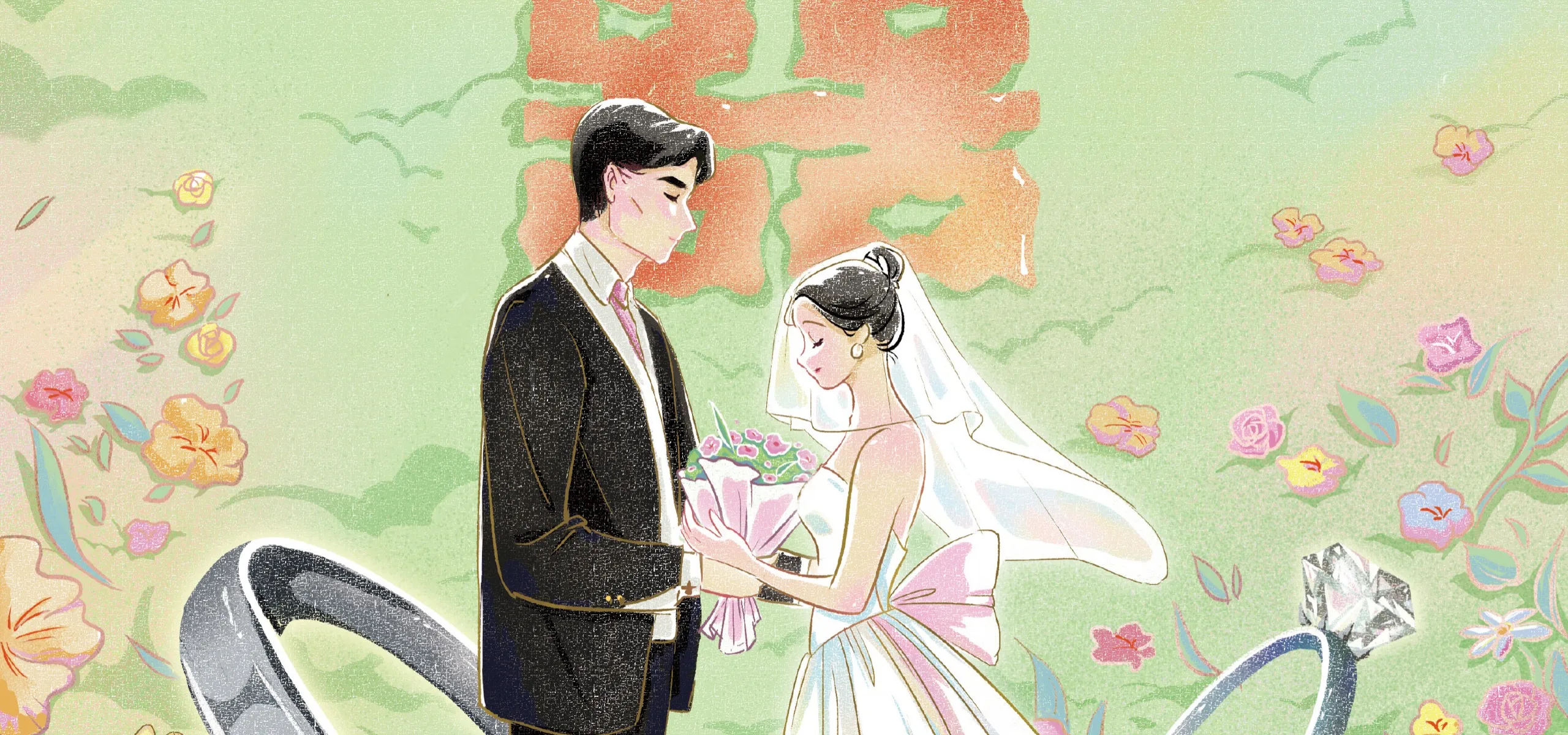Celebration of love or social obligation? Learn the language of Chinese weddings, from invitations to the ceremony itself
A young woman surnamed Shi from Wuzhou, Guangxi, may have been one of the busiest people in China during the National Day holiday this October: She received 21 wedding invitations from colleagues, friends, and former classmates, all scheduled during the seven-day break. On her busiest day, she attended five of them.
Hopping between venues on a tight schedule might not have been the most stressful part of Shi’s holiday. She would have to show up at each occasion bearing 份子钱 (fènziqián) or 礼金 (lǐjīn), cash gifts wrapped in 红包 (hóngbāo, “red envelopes”) that were originally intended to help the family cover the costs of the big event, but are now often given as part of well-wishing or due to social pressure—in many parts of China, the bigger the cash amount the better.
According to Chinese media reports, for each hongbao (or more likely, mobile hongbao) Shi prepared for each wedding, she had to shell out 300 to 800 yuan, based on her closeness with the couple. The amount can reach up to thousands in big cities like Beijing and Shanghai. It’s little wonder that major holidays where most people visit their hometown and attend weddings are dreaded by cash-strapped young people.
Weddings aren’t just stressful for guests. A user on Q&A platform Zhihu once shared the itinerary of her big day, a typical one in China nowadays: getting up at the crack of dawn for makeup and hair, elaborate photo shoots with costumes (often taking place weeks before the wedding, and sometimes in exotic venues), “door games” (challenges the bridesmaids set up for the groom and groomsmen when they pick up the bride), rituals to honor the couples’ parents at each of their homes, more photos (now with the parents), greeting the guests, the actual ceremony, going around every table to drink toasts with the guests, and having no time to eat. Oh, and there are several outfit changes between these events.
Some young people are trying to rebel against this tradition by holding destination weddings or minimalist ceremonies. But most still honor their parents’ wishes for a “sense of ritual (仪式感 yíshìgǎn)” by holding a big blowout to impress their entire extended family and social network. According to MarryMemo, a major Chinese wedding service platform, an average wedding in 2021 cost around 253,000 yuan, an increase of 3.8 times compared to five years ago, and weddings during this year’s National Day holiday took an average of 7.6 months to prepare.
The announcement
These days, nothing is official until it’s social media official. The first clue of an upcoming wedding might come in the form of a 官宣 (guānxuān, official announcement) on the couple’s WeChat, Weibo, or Xiaohongshu (RED) accounts. These declarations often feature photos of the proposal with balloons, flowers, and candles on the floor. An emotional caption is the cherry on top, but for those already too choked-up to come up with their own, cookie-cutter templates can come in handy:
I may not have been part of your past, but I will always be there in your future.
你的过去我来不及参与,你的未来我奉陪到底。
The more literary-inclined might take inspiration from famous writers, such as Qian Zhongshu (钱钟书), who remained together with his first love and wife Yang Jiang (杨绛), also a renowned writer, through many ups and downs for 65 years until his death:
Before meeting you, I never thought about marrying. After we met, I’ve never thought about marrying anyone else.
没遇见你之前,我没想过结婚,遇见你之后,结婚这回事,我没想过和别人。
Some wait for the next level of commitment before dropping the bomb on their friends and family. If someone proudly announces they “got the certificate (领证啦 lǐngzhèng la),” it almost certainly refers to the marriage certificate, a document declaring that the couple’s union is now recognized by the government:
Today we got the certificate, and are about to embark on an unknown future with a known person.
今天领证啦,和已知的人去过未知的生活。
The invitations
Things start to get real when the wedding invitations (婚礼请柬 hūnlǐ qǐngjiǎn) finally go out, typically one month prior to the ceremony so that both the hosts and guests have time to make arrangements.
We sincerely invite you to our wedding, and hope you can witness our special day!
诚邀您参加我们的结婚典礼,希望在这特殊的一天,能有您的见证!
Nowadays, invitations are typically digital, sent via WeChat. This leaves room for the couple to include more photos, tear-jerking music, and stories of a love that has 修成正果 (xiūchéng zhèngguǒ, made it to marriage):
From school uniform to wedding dress, we’ve been together for eight years. At the end of this month, we are finally getting married.
从校服到婚纱,恋爱长跑8年,这个月底,我们终于要结婚了。
While everyone is obliged to reply with 恭喜 (gōngxǐ, congratulations) or 百年好合 (bǎinián hǎohé, wish you long lasting love), to go or not is a tougher question. The closest friends and family will likely immediately confirm their attendance, or send their regrets and good wishes if they can’t. But many, upon receiving invitations from friends and relatives they have long drifted apart from, are trying to get out of this obligation and save some cash:
Every time I see a wedding invitation, I send my well-wishes, but also start to think of ways to get back all the cash gifts I gave out without having to get married myself.
每次看到婚礼请帖,除了祝福就是思考不通过结婚,礼金怎么样才能回来。
And if you get an invitation out of the blue from some long-forgotten ex, it might be time to make some snarky excuses:
I can’t go because it’s hard to rearrange my work schedule, but I will definitely be there next time!
我工作不好安排就不去了,下次一定去!
The big day
Other than the formalities, the busy schedule, and the risky wager of fenziqian, too often, wedding guests have to suffer through a professional master-of-ceremonies talking too much and making too many corny jokes. Some MCs will not let you forget that patriarchy is still in the air as the bride’s father “gives” her away.
However, for those who can see past it all, at the end of the day, weddings are still supposed to be a celebration of love. Whether they’re cliche or spontaneous, it’s not uncommon for beautiful moments in the ceremony, especially the wedding vows, to bring out a few sniffles from the witnessing crowd.
I’ve always believed that I would only marry for love. Finally, this moment I’ve waited for is here today.
我一直坚信,如果有一天要结婚,一定要嫁给爱情。今天我等到了这一刻。
The most popular vow, however, comes from the poem “Drum” from China’s oldest collection of poetry, aptly titled the Classic of Poetry (《诗经》), which features poems and ballads from the 11th to 6th century BCE. Though these lines originally described the friendship between soldiers and their homesickness in the time of war, they’ve evolved into a wedding pledge in modern China that can make you sound both educated and profound:
Be it life or death, I vow to you: We’ll grow old together hand in hand.
死生契阔,与子成说。执子之手,与子偕老。
Marriage is also often about the union between two families, who are rarely absent from wedding vows:
I want to tell my parents, though today I got married, you are not losing a daughter, but gaining a son.
我想对我的爸爸妈妈说,今天我结婚了,但你们不是失去了一个女儿,而是多了一个儿子。
After the ceremony, the couple goes around to have a toast with all the guests. This is when many drink to the newlyweds’ happiness, and express how touched they are by the wedding:
I hope you will have love and each other for the rest of your lives.
希望你们永远拥有爱情,往后余生皆是彼此。
I believe in love again.
我又相信爱情了。
Perhaps weddings do help solidify relationships after all, as some couples look back at their big day and swear:
The wedding is so tiring that I never want to do it again, so my partner and I promise we will never divorce.
办婚礼太累了,再也不想有第二次了,我和我的伴侣都说绝对不离婚。
Talk Your Way Through a Chinese Wedding is a story from our issue, “Promised Land.” To read the entire issue, become a subscriber and receive the full magazine.













